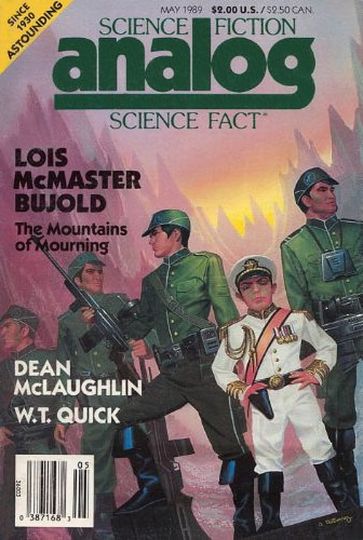Brian:
I had read The Mountains of Mourning about a year ago, during a period when I was in a big mood for novellas. I ended up reading all the novellas nominated for the 1990 Hugo and in hindsight this one might be my pick, although “A Touch of Lavender” is also excellent. It was my first Bujold story and remains the only one so far — but I’ll fix that soon.
Calling it a murder mystery would be technically accurate, but solving the murder is not really the point. It’s also military SF, but that doesn’t really do it either because when told we’re about to read military SF we’re given the implicit expectation of machismo and violent heroism. Miles does do something pretty heroic ultimately, but it’s not “manly.” This is not a story about soldiers testing their meddle in a hostile environment in conventional terms. This is an incredibly tender narrative that takes its time with humanizing characters.
Miles is obviously a character Bujold loves and I’ve HEARD that in some other stories starring him things are set up in such a way that he gets what he wants rather conspicuously, but that’s not an issue here. He doesn’t fall into May Suedom because he has to think about what the right thing to do would be, and he doesn’t always know what the right thing is. Are you sure this was published in Analog? Anyway, I don’t get why Dozois didn’t include it in his Year’s Best SF for the respective year. Maybe he ran out of space and it’s an honorable mention. I would’ve added it.
One reason I’d not gotten into Bujold before is that her biggest series, the Vorkosigan universe, is vast and books are published out of chronological order, never mind series within the series. But this is a nice self-contained narrative that suggests a large overarching narrative but which can be understood fine by itself.
Kris:
So my feelings on this text are complicated. I am not sure what Bujold is going for here but it works in an unexpected way for me.
It is engaging in a kind of autocritique. A criticism I have seen levelled at the series is how aristocratic it is, Miles and Cordelia are part of the elite and it is their views on scenarios that we most commonly see. As such the fact that even though the main characters are disabled and a woman respectively, they still have a degree of privilege in society. What this story asks is, what is it like for the poorest of society dealing with the same problems. As such Miles is torn between the horrors of the life he sees, the prejudice he encounters and the guilt over how the military elite is exploiting these people.
Bujold does not attempt to go for easy answers. The ending is complicated and we can be left feeling uncomfortable. But I also think that is the right choice. She is delving into incredibly complicated and emotionally fraught
circumstances. The best you can do is put these ideas out there, let people see all perspectives and they can make their own conclusions.

